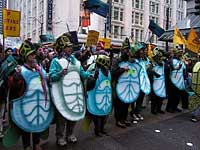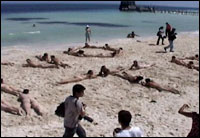Tom Turner is senior editor at Earthjustice, a nonprofit environmental law firm based in Oakland, Calif. He edited daily newspapers at the WTO meeting in Seattle in 1999 and the World Summit on Sustainable Development in Johannesburg in 2002. He is the author of many books and articles on environmental subjects, most recently Justice on Earth: Earthjustice and the People It Has Served.

Monday, 8 Sep 2003
CANCUN, Mexico
Will it be a replay of Seattle 1999? That’s a question on many minds as delegates, 4,000 observers, 1,500 journalists, and tens of thousands of critics arrive in this overbuilt resort town for the fifth ministerial meeting of the 146-member World Trade Organization.

Taking it to the streets of Seattle in 1999.
Beyond a handful of black-clad troublemakers who broke a few windows and generated hysterical press coverage, the real story behind the Seattle protests of 1999 was the 50,000 peaceful protesters who came to voice their displeasure with the way the WTO manages global trade and runs roughshod over domestic laws protecting public health, workers’ rights, environmental quality, and natural resources. The other story was resistance by poorer countries that objected to heavy-handed tactics by the U.S., the European Union, and other wealthy countries; it was this courageous resistance, in the end, that caused the Seattle ministerial to conclude in chaos and failure.
Early reports suggest that there may be plenty of tension in the air when the WTO meetings get underway here on Wednesday. Mexico is reported to be making it difficult for potential protesters to attend the meetings or associated teach-ins and rallies. Some groups report that their applications for visas or credentials have been mysteriously lost. Mexico is charging representatives of WTO-accredited nongovernmental organizations $99 for a visa-like document, a sum that will make it difficult for some organizations to be represented. A Mexican newspaper recently reported that the government has put together a list of 60 incomodos (undesirables) to be “monitored” this week in Cancun, including Ralph Nader, Noam Chomsky, Lori Wallach of Public Citizen, and many other prominent WTO critics. We’ll see.

Taking it to the beach in Cancun.
Photo: IndyMedia.org.
In the official proceedings, it looks as if agricultural subsidies and tariffs will again be a hot topic, and here the split between north and south is quite stark. The U.S. and the E.U., despite differences over hormone-fed beef and genetically modified foodstuffs, are at odds with other countries, led by China, India, and Brazil, over how to proceed with what they call the “liberalization” of trade in agricultural products. All countries want to gain access to foreign markets; they also want to protect their own farmers. (The U.S. is more interested in protecting its mega-agribusinesses than its family farms, but that’s another story we shall return to later.) It is a thorny problem that could, they say, derail this meeting altogether.
Meanwhile, the big kahunas of the WTO have dreams of launching formal negotiations on four new topics: investment, government procurement, competition, and facilitation. In general, these would mean easing rules that hinder transnational corporations from doing business as they see fit, anywhere and everywhere. What they hope for with respect to government procurement, for example, would be rules to make it illegal for city governments to require that a percentage of city contracts be awarded to companies within that city. It’s far more complicated, of course, but it’s easy to see why there’s determined resistance to the idea.
In addition to street demonstrations, there are scores of panels and workshops and lectures and other presentations, some critical of the WTO and some seeking alternatives to the way the WTO goes about its business. I’ll get to as many as I can. The official meetings begin Wednesday and are scheduled to run through Sunday. I’ll be reporting daily. If you have questions, please send them to emailE=(‘ecoeditor@’ + ‘yahoo.com’) document.write(‘‘ + emailE + ‘‘) .

